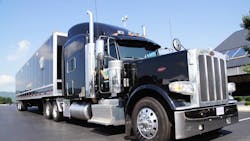Smith Transport, a Pennsylvania-based provider of logistics services, has switched its ownership structure to an Employee Stock Ownership Plan (ESOP). The transaction closed on Dec. 12, 2014.
“Employee ownership is the best direction for the future of Smith Transport. Sharing the success of the company with the employees is a great way to reward all of our dedicated employees, and it will serve as a great tool for driver recruitment and retention,” said Barry Smith, Smith Transport’s owner-operator.
The transaction was handled by investment bank ButcherJoseph & Co.
“Selling a company to its employees is a highly technical transaction, especially when it comes to raising the necessary capital. It was a privilege to work with Barry and his executive management team to facilitate the process and identify the right capital sources for such a great company like Smith Transport,” said Garry Karch, ButcherJoseph managing director.
About the Author
Fleet Owner Staff
Our Editorial Team
Kevin Jones, Editorial Director, Commercial Vehicle Group
Cristina Commendatore, Executive Editor
Scott Achelpohl, Managing Editor
Josh Fisher, Senior Editor
Catharine Conway, Digital Editor
Eric Van Egeren, Art Director
